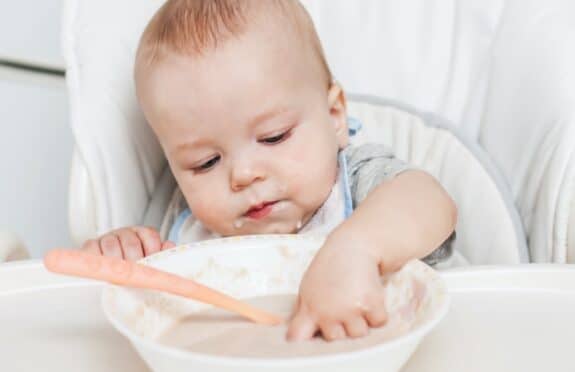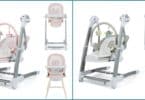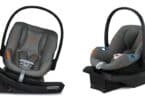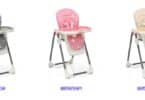Transitioning your baby over to solids should be just as safe and straightforward as breast or bottle feeding. Instead, parents are left to worry about what their child’s first foods contain – and how it might ultimately affect their health and development.
In a study commissioned by Healthy Babies Bright Futures, researchers found heavy metals in nearly all of the 168 U.S.-sold baby foods tested.
- An astounding 95 percent contained lead (with one in five having more than 10 times the maximum limit)
- 75 percent contained cadmium
- 73 percent tested positive for arsenic
- 32 percent contained mercury
One-fourth of all the foods tested positive for all four of these dangerous heavy metals.
No amount of heavy metals are considered “safe” for consumption – especially when it comes to kids when even limited exposure to these chemicals can erode a child’s IQ and negatively impede healthy neurodevelopment. In one study that specifically examined the impact of arsenic exposure in children from Bangladesh, researchers associated a 50 percent increase in arsenic exposure to a 0.4-point decrease in the IQ of children between the ages of 5 and 15.
“Even in the trace amounts found in food, these contaminants can alter the developing brain and erode a child’s IQ. The impacts add up with each meal or snack a baby eats,” the report said.
This isn’t the first study to detect heavy metals in baby foods. Previous research from the Food and Drug Administration found at least one of the four heavy metals in 33 of the 39 different baby foods tested.
Rice-based foods (including rice-based cereals, snacks, and dishes) pose the greatest risk for heavy metal exposure – particularly arsenic – with one in five containing 10 times more than the maximum limit set by U.S. government officials. Other major offenders included foods containing sweet potatoes and fruit juices.
“These popular baby foods are not only high in inorganic arsenic, the most toxic form of arsenic, but also are nearly always contaminated with all four toxic metals,” the report said.
You can’t rely on organic foods either. Brown rice sweetener, which is a common sweetener in organic foods, was found to contain significant amounts of arsenic. One such product, an organic milk product marketed to toddlers, had arsenic levels that were six times above what’s considered dangerous by the U.S. Environmental Protection Agency.
The report says that the government needs to take immediate action. The FDA has been investigating ways to reduce the presence of heavy metals in baby foods, and levels are lower than they were a decade ago, but they’re still too high. And they are the only ones that can truly force manufacturers to comply.
“When the FDA acts, companies respond. We need the FDA to use their authority more effectively, and much more quickly, to reduce toxic heavy metals in baby foods,” said study author Jane Houlihan, research director for Healthy Babies Better Futures, in a statement.
In the meantime, parents need to be both selective and proactive.
If at all possible, make your baby’s food at home. Avoid using any form of rice in your homemade foods – especially brown and wild rices, which are notorious for their high levels of arsenic. Carrots and sweet potatoes also carry a higher risk of heavy metal exposure, so limit them and lean more toward a wide variety of fruits and vegetables when crafting your baby’s food.
Whenever you need to rely on store-bought foods, avoid all rice-containing foods and cereals. Offer your child water or milk instead of juice. Also, offer a wide variety of fruits and vegetables and avoid those with sweet potatoes and carrots as much as humanly possible.
Above all else, remember that solids should not be started too soon – especially when taking this new information into consideration.
Pediatricians and health organizations say breast is best up until 6 months, but in lieu of that, use only formula until your baby hits that age.
Then solids can slowly be added into your baby’s diet.
“Best first foods for infants are avocado, pureed veggies, peanut-butter oatmeal and salmon,” Tanya Altmann, pediatrician and the author of “What to Feed Your Baby” said. “They all provide important nutrients that babies need, help develop their taste buds to prefer healthy food and may decrease food allergies.”








